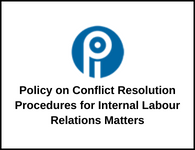Policy on Conflict Resolution Procedures for Internal Labour Relations Matters
Preamble
1. Effective Date
February 21, 2014
2. Policy Objective
3. Policy Requirements
Part A - Other Conflict Resolution, Discipline and Related Matters
1. Conflict Resolution – Member & Employee
- Should a difference of opinion occur between an Institute employee and an Institute member, the matter shall be referred to the employee's supervisor. The final arbiter shall be the Board of Directors. Both employees and members shall have the right to appeal to the Board.
- To provide optimum utilization of Institute employees' time, requests for information of services made by members shall be processed through the appropriate level of management.
- Where, in the opinion of an Institute member, the actions or proposed actions of an employee are in conflict with the Institute By-Laws, Regulations, policies and/or procedures, the Institute member shall be responsible for drawing such actions or proposed actions to the attention of the appropriate Executive for discussion forthwith. If a conflict still exists, the Institute member shall then inform Institute management.
BOD May 15, 1993
2. Conflict Resolution Procedures - Internal Labour Relations Matters
Last Revised - May 13, 1999
-
Preamble
Occasionally, there are situations when disagreements arise between staff and members on the handling of individual cases. Such disagreements can relate to the strategy to be used or even whether to proceed or not to proceed with a formal intervention. Disagreements can relate to what is in the best interests of the member or to potential jeopardy of the interests and rights of other members.
-
Procedures
- When a member and a staff officer disagree on the handling of the member's case, the individuals involved should attempt to resolve differences through an in-depth discussion of the case. The staff officer shall provide the member with a rationale for the strategy being proposed and any supporting jurisprudence for the member's consideration. The member should also put forward to the staff officer, in writing, the reasons for proposing a different approach in the handling of the case.
- If an impasse is reached between the member and the staff officer, the matter, along with the legal and labour relations merits of the case and the relevant positions of the affected member and the responsible staff officer, shall be referred to the Manager, Representational Services.
- If an impasse is reached between the Manager, Representational Services, and the member, the matter will be referred to the General Counsel who will conduct an investigation. The member will have an opportunity to make submissions to the General Counsel before the General Counsel renders an opinion on the matter to the President. The General Counsel will then prepare an analysis of the situation and make an appropriate recommendation to the President. The analysis and recommendation will not be made available to the member. The General Counsel, in reviewing the case and making a recommendation, will do so on the basis of the inherent duty of fair representation.
- The President will review the recommendation of the General Counsel and make a decision on the matter. The decision of the President shall be final. The President's decision will be communicated to the affected member and involved Institute staff as required. The President will advise the Executive Committee of his decision.


